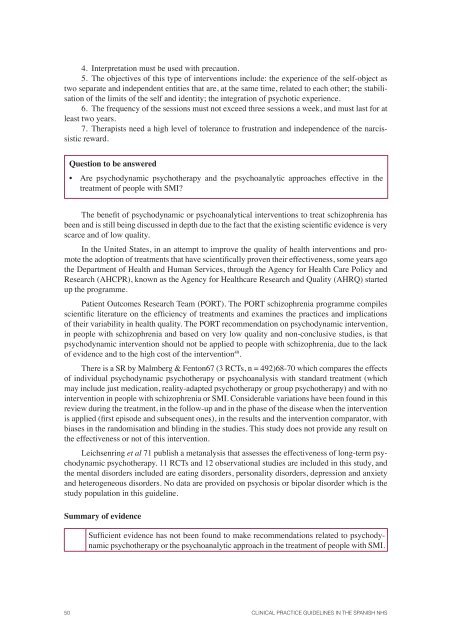CPG for Psychosocial Interventions in Severe Mental ... - GuÃaSalud
CPG for Psychosocial Interventions in Severe Mental ... - GuÃaSalud
CPG for Psychosocial Interventions in Severe Mental ... - GuÃaSalud
Create successful ePaper yourself
Turn your PDF publications into a flip-book with our unique Google optimized e-Paper software.
4. Interpretation must be used with precaution.<br />
5. The objectives of this type of <strong>in</strong>terventions <strong>in</strong>clude: the experience of the self-object as<br />
two separate and <strong>in</strong>dependent entities that are, at the same time, related to each other; the stabilisation<br />
of the limits of the self and identity; the <strong>in</strong>tegration of psychotic experience.<br />
6. The frequency of the sessions must not exceed three sessions a week, and must last <strong>for</strong> at<br />
least two years.<br />
7. Therapists need a high level of tolerance to frustration and <strong>in</strong>dependence of the narcissistic<br />
reward.<br />
Question to be answered<br />
• Are psychodynamic psychotherapy and the psychoanalytic approaches effective <strong>in</strong> the<br />
treatment of people with SMI?<br />
The benefit of psychodynamic or psychoanalytical <strong>in</strong>terventions to treat schizophrenia has<br />
been and is still be<strong>in</strong>g discussed <strong>in</strong> depth due to the fact that the exist<strong>in</strong>g scientific evidence is very<br />
scarce and of low quality.<br />
In the United States, <strong>in</strong> an attempt to improve the quality of health <strong>in</strong>terventions and promote<br />
the adoption of treatments that have scientifically proven their effectiveness, some years ago<br />
the Department of Health and Human Services, through the Agency <strong>for</strong> Health Care Policy and<br />
Research (AHCPR), known as the Agency <strong>for</strong> Healthcare Research and Quality (AHRQ) started<br />
up the programme.<br />
Patient Outcomes Research Team (PORT). The PORT schizophrenia programme compiles<br />
scientific literature on the efficiency of treatments and exam<strong>in</strong>es the practices and implications<br />
of their variability <strong>in</strong> health quality. The PORT recommendation on psychodynamic <strong>in</strong>tervention,<br />
<strong>in</strong> people with schizophrenia and based on very low quality and non-conclusive studies, is that<br />
psychodynamic <strong>in</strong>tervention should not be applied to people with schizophrenia, due to the lack<br />
of evidence and to the high cost of the <strong>in</strong>tervention 49 .<br />
There is a SR by Malmberg & Fenton67 (3 RCTs, n = 492)68-70 which compares the effects<br />
of <strong>in</strong>dividual psychodynamic psychotherapy or psychoanalysis with standard treatment (which<br />
may <strong>in</strong>clude just medication, reality-adapted psychotherapy or group psychotherapy) and with no<br />
<strong>in</strong>tervention <strong>in</strong> people with schizophrenia or SMI. Considerable variations have been found <strong>in</strong> this<br />
review dur<strong>in</strong>g the treatment, <strong>in</strong> the follow-up and <strong>in</strong> the phase of the disease when the <strong>in</strong>tervention<br />
is applied (first episode and subsequent ones), <strong>in</strong> the results and the <strong>in</strong>tervention comparator, with<br />
biases <strong>in</strong> the randomisation and bl<strong>in</strong>d<strong>in</strong>g <strong>in</strong> the studies. This study does not provide any result on<br />
the effectiveness or not of this <strong>in</strong>tervention.<br />
Leichsenr<strong>in</strong>g et al 71 publish a metanalysis that assesses the effectiveness of long-term psychodynamic<br />
psychotherapy. 11 RCTs and 12 observational studies are <strong>in</strong>cluded <strong>in</strong> this study, and<br />
the mental disorders <strong>in</strong>cluded are eat<strong>in</strong>g disorders, personality disorders, depression and anxiety<br />
and heterogeneous disorders. No data are provided on psychosis or bipolar disorder which is the<br />
study population <strong>in</strong> this guidel<strong>in</strong>e.<br />
Summary of evidence<br />
Sufficient evidence has not been found to make recommendations related to psychodynamic<br />
psychotherapy or the psychoanalytic approach <strong>in</strong> the treatment of people with SMI.<br />
50 CLINICAL PRACTICE GUIDELINES IN THE SPANISH NHS

















